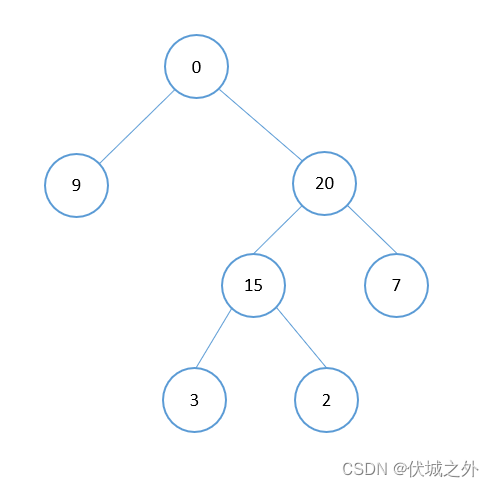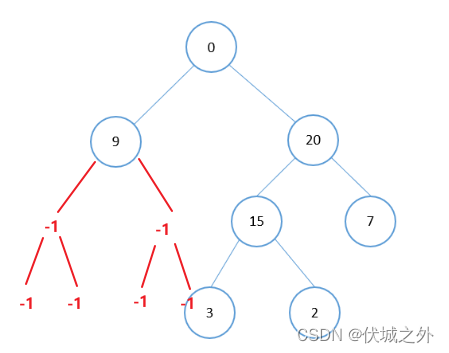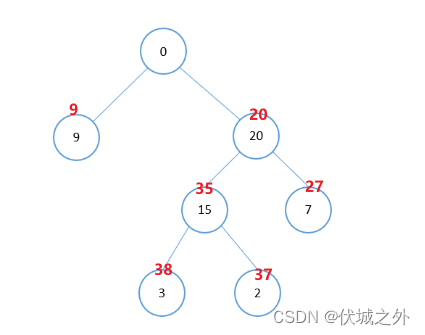题目描述
给定一个二叉树,每个节点上站一个人,节点数字表示父节点到该节点传递悄悄话需要花费的时间。
初始时,根节点所在位置的人有一个悄悄话想要传递给其他人,求二叉树所有节点上的人都接收到悄悄话花费的时间。
输入描述
给定二叉树
0 9 20 -1 -1 15 7 -1 -1 -1 -1 3 2
注:-1表示空节点

输出描述
返回所有节点都接收到悄悄话花费的时间
38
用例
| 输入 | 0 9 20 -1 -1 15 7 -1 -1 -1 -1 3 2 |
| 输出 | 38 |
| 说明 | 无 |
题目解析
题目给的输入信息对照图示来看,应该就是二叉树的层序遍历序列,如下图所示:

层序遍历序列中,父子节点存在如下关系:
如果父节点在序列中的索引是k,则其两个子节点在序列中的索引分别为 2k+1, 2k+2
因此,我们就无需建树操作了。
而悄悄话的传递,其实父节点将自身得到消息的时延累加到其各个子节点上,最终叶子节点中最大的时延值就是:二叉树所有节点上的人都接收到悄悄话花费的时间

JS算法源码
const rl = require("readline").createInterface({ input: process.stdin });
var iter = rl[Symbol.asyncIterator]();
const readline = async () => (await iter.next()).value;
void (async function () {
const times = (await readline()).split(" ").map(Number);
// 记录题解
let ans = 0;
// 根节点的索引是0
const queue = [0];
while (queue.length > 0) {
const fa = queue.shift(); // 父节点索引
const ch1 = 2 * fa + 1; // 左子节点索引
const ch2 = 2 * fa + 2; // 右子节点索引
// fa是否存在左子节点
const ch1_exist = ch1 < times.length && times[ch1] != -1;
// fa是否存在右子节点
const ch2_exist = ch2 < times.length && times[ch2] != -1;
// fa如果存在左子节点
if (ch1_exist) {
times[ch1] += times[fa];
queue.push(ch1);
}
// fa如果存在右子节点
if (ch2_exist) {
times[ch2] += times[fa];
queue.push(ch2);
}
// fa是叶子节点
if (!ch1_exist && !ch2_exist) {
// 保留叶子节点中最大时延
ans = Math.max(ans, times[fa]);
}
}
console.log(ans);
})();
Java算法源码
import java.util.Arrays;
import java.util.LinkedList;
import java.util.Scanner;
public class Main {
public static void main(String[] args) {
Scanner sc = new Scanner(System.in);
int[] times = Arrays.stream(sc.nextLine().split(" ")).mapToInt(Integer::parseInt).toArray();
// 记录题解
int ans = 0;
// 根节点的索引是0
LinkedList<Integer> queue = new LinkedList<>();
queue.addLast(0);
while (queue.size() > 0) {
int fa = queue.removeFirst(); // 父节点索引
int ch1 = 2 * fa + 1; // 左子节点索引
int ch2 = 2 * fa + 2; // 右子节点索引
// fa是否存在左子节点
boolean ch1_exist = ch1 < times.length && times[ch1] != -1;
// fa是否存在右子节点
boolean ch2_exist = ch2 < times.length && times[ch2] != -1;
// fa如果存在左子节点
if (ch1_exist) {
times[ch1] += times[fa];
queue.addLast(ch1);
}
// fa如果存在右子节点
if (ch2_exist) {
times[ch2] += times[fa];
queue.addLast(ch2);
}
// fa是叶子节点
if (!ch1_exist && !ch2_exist) {
// 保留叶子节点中最大时延
ans = Math.max(ans, times[fa]);
}
}
System.out.println(ans);
}
}
Python算法源码
# 输入获取
times = list(map(int, input().split()))
# 算法入口
def getResult():
# 记录题解
ans = 0
# 根节点的索引是0
queue = [0]
while len(queue) > 0:
fa = queue.pop(0) # 父节点索引
ch1 = 2 * fa + 1 # 左子节点索引
ch2 = 2 * fa + 2 # 右子节点索引
# fa是否存在左子节点
ch1_exist = ch1 < len(times) and times[ch1] != -1
# fa是否存在右子节点
ch2_exist = ch2 < len(times) and times[ch2] != -1
# fa如果存在左子节点
if ch1_exist:
times[ch1] += times[fa]
queue.append(ch1)
# fa如果存在右子节点
if ch2_exist:
times[ch2] += times[fa]
queue.append(ch2)
# fa是叶子节点
if not ch1_exist and not ch2_exist:
# 保留叶子节点中最大时延
ans = max(ans, times[fa])
return ans
# 算法调用
print(getResult())
C算法源码
#include <stdio.h>
#include <stdlib.h>
#define MAX(a,b) ((a) > (b) ? (a) : (b))
#define MAX_SIZE 10000
typedef struct ListNode {
int ele;
struct ListNode *next;
} ListNode;
typedef struct LinkedList {
int size;
ListNode *head;
ListNode *tail;
} LinkedList;
LinkedList *new_LinkedList() {
LinkedList *link = (LinkedList *) malloc(sizeof(LinkedList));
link->size = 0;
link->head = NULL;
link->tail = NULL;
return link;
}
void addLast_LinkedList(LinkedList *link, int ele) {
ListNode *listNode = (ListNode *) malloc(sizeof(ListNode));
listNode->ele = ele;
listNode->next = NULL;
if(link->size == 0) {
link->head = listNode;
link->tail = listNode;
} else {
link->tail->next = listNode;
link->tail = listNode;
}
link->size++;
}
int removeFirst_LinkedList(LinkedList* link) {
if(link->size == 0) exit(-1);
ListNode* removed = link->head;
if(link->size == 1) {
link->head = NULL;
link->tail = NULL;
} else {
link->head = link->head->next;
}
link->size--;
int res = removed->ele;
free(removed);
return res;
}
int main() {
int times[MAX_SIZE];
int times_size = 0;
while (scanf("%d", ×[times_size++])) {
if(getchar() != ' ') break;
}
// 记录题解
int ans = 0;
// 根节点的索引是0
LinkedList* queue = new_LinkedList();
addLast_LinkedList(queue, 0);
while (queue->size > 0) {
int fa = removeFirst_LinkedList(queue); // 父节点索引
int ch1 = 2 * fa + 1; // 左子节点索引
int ch2 = 2 * fa + 2; // 右子节点索引
// fa是否存在左子节点
int ch1_exist = ch1 < times_size && times[ch1] != -1;
// fa是否存在右子节点
int ch2_exist = ch2 < times_size && times[ch2] != -1;
// fa如果存在左子节点
if(ch1_exist) {
times[ch1] += times[fa];
addLast_LinkedList(queue, ch1);
}
// fa如果存在右子节点
if(ch2_exist) {
times[ch2] += times[fa];
addLast_LinkedList(queue, ch2);
}
// fa是叶子节点
if(!ch1_exist && !ch2_exist) {
// 保留叶子节点中最大时延
ans = MAX(ans, times[fa]);
}
}
printf("%dn", ans);
return 0;
}免责声明:
1、IT资源小站为非营利性网站,全站所有资料仅供网友个人学习使用,禁止商用
2、本站所有文档、视频、书籍等资料均由网友分享,本站只负责收集不承担任何技术及版权问题
3、如本帖侵犯到任何版权问题,请立即告知本站,本站将及时予与删除下载链接并致以最深的歉意
4、本帖部分内容转载自其它媒体,但并不代表本站赞同其观点和对其真实性负责
5、一经注册为本站会员,一律视为同意网站规定,本站管理员及版主有权禁止违规用户
6、其他单位或个人使用、转载或引用本文时必须同时征得该帖子作者和IT资源小站的同意
7、IT资源小站管理员和版主有权不事先通知发贴者而删除本文
评论0